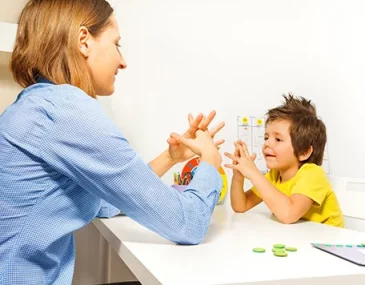“I want it”, ” I won’t do it”, “I won’t eat that” and “No, I will not do homework”- are these the repeat phrases your child is making every day? Or, worse, you see your child never listens to you and nag about almost everything. Yes, this is a common scenario in almost every household.
Tantrums can stem from various factors like fear, frustration, anger, or sensory overload. They are basically a child’s way of coping with overwhelming emotions when they can’t express themselves in a more mature manner. If tantrums result in the child getting what they want or avoiding something they dislike, they may continue to rely on this behavior.
And, most importantly, parents must understand the fact that tantrums are a learned response, and the goal is to help the child unlearn this behavior and develop more mature ways of handling difficult situations.
In this blog, we have come up with some effective tips from our therapists who have been offering result-driven ABA Therapy for children. These tips can help parents deal with their children’s tantrums like a pro.
Let’s First, Understand The Behavioral Traits Or Symptoms Of Children’s Tantrums
- Engaging in arguments with the parent.
- Displaying physical aggression such as kicking, hitting, or pinching.
- Whining, crying, shouting, and using inappropriate language, ripping clothes or books.
- Becoming unresponsive and refusing to speak.
- Throwing objects at people or in the surroundings, even against walls.
- Behaving rudely or being nasty towards siblings, possibly involving physical aggression.
- Avoiding tasks like homework, bedtime, or ending playtime, social interactions with friends or family members.
- Isolating themselves in their room or withdrawing to a corner.
- Threatening to harm themselves or the parent.
- And, etc.
Best Tips To Handle A Child’s Tantrum
- Help Your Kid Learn How To Talk Politely
Help your child understand their emotions by using words to label different feelings. Starting from a young age, you can talk to them about emotions like happiness, sadness, anger, tiredness, hunger, and comfort.
Your child often struggles to find the right words to express his/her desires. The next time your child gets frustrated over wanting something at the grocery store, you can guide them by saying, “Say, ‘Can I have the candy, please?'” As soon as they make the request, you can respond positively, “Yes, you can!” Sometimes, they simply need a little assistance in learning how to ask for something politely.
- Identify Triggers And Plan Accordingly
Identify triggers that often lead to tantrums, such as tiredness, hunger, worries, fears, or overstimulation. By recognizing these triggers, you can plan ahead and try to avoid them. For example, schedule shopping trips after your child has napped or eaten.
When your child throws a tantrum at the doctor’s office because they want to go to the park, try saying, “First, we have to see the doctor, but after we leave, you can have a piece of chocolate before dinner!” Kids can’t always have everything they want immediately, but providing them with a substitute that they still enjoy can help diffuse the situation.
- Wait It Out
Take a deep breath and wait for your child to calm down. By withholding the desired item during a tantrum, you gradually teach them that throwing a fit won’t get them what they want. The idea is to avoid immediately giving in to their demands, as it reinforces the notion that tantrums are an effective way to get what they desire. Waiting it out helps them learn that tantrums are not effective means of communication.
Acknowledge and reinforce positive behavior when your child handles difficult situations without resorting to a tantrum. Encourage them to reflect on how it feels to remain calm and composed in those instances.
- Engage In A Healthy Conversation
Engage in conversations about emotions after a tantrum, once your child has calmed down. Help them understand the reasons behind their actions by asking questions. Set a positive example by demonstrating healthy ways to manage stress. Show your child how to react positively to challenging situations. All these will help you to foster emotional awareness and provide your child with alternative coping mechanisms, ultimately reducing the frequency of tantrums.
It’s worth noting that older children can also experience tantrums. This may be because they haven’t yet learned effective and safe methods to express or manage their emotions.
Bottom Line
Dealing with tantrums can be a tough task to handle on your own. Remember to take a moment to breathe and don’t be too hard on yourself or your child.
If you still believe you need to talk to a specialist about the problematic behavior, you can come to our ABA center in Dubai. We carefully assess the condition of each child and offer one-of-a-kind ABA therapy.
Dial our number to schedule a free consultation today!






